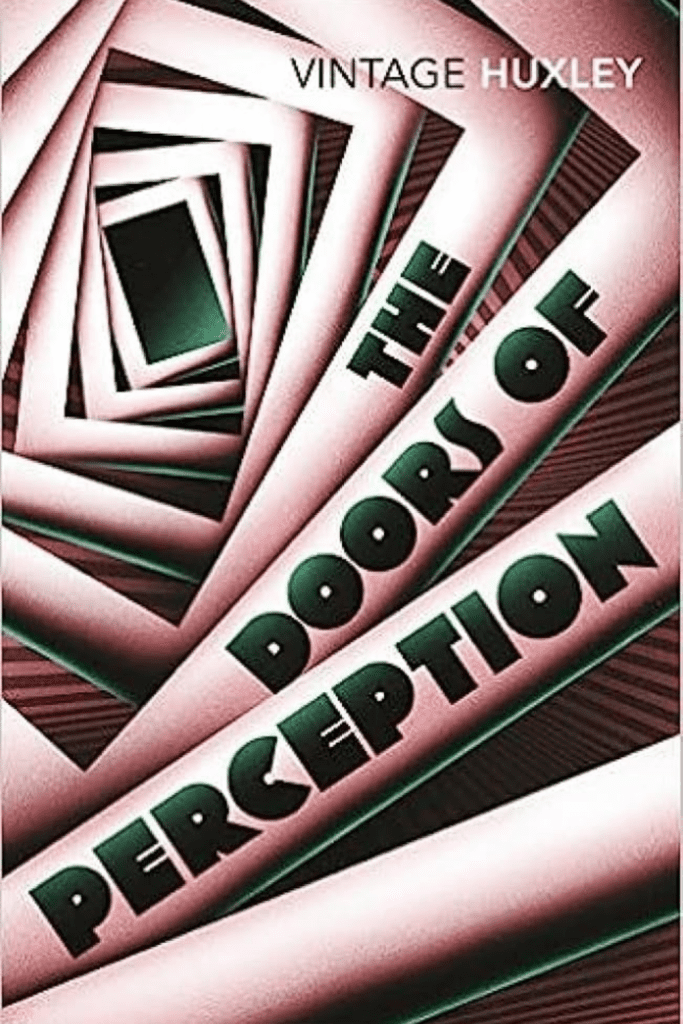This post may contain affiliate links, which means I’ll receive a commission if you purchase through my links, at no extra cost to you. Please read my full disclosure for more information.
“The Doors of Perception” is Aldous Huxley’s philosophical account of his supervised mescaline (a psychedelic substance) trip in the 1950s.

- Date finished: March 26th, 2025
- Pages: 208
- Format: Paperback
- Form: Non-Fiction
- Language read: English
- Series: Standalone
- Genre: Philosophy | Sprituality | Essay
“The Doors of Perception” is Aldous Huxley’s philosophical account of his supervised mescaline (a psychedelic substance) trip in the 1950s.

I think the best way to read “The Doors of Perception” is by going through it with an open mind and some sort of interest in the subject matter. Why do I say this? Because I’ve tried reading this 2 years ago and couldn’t get past the first 2 pages. Then I tried psilocybin and had a transformative experience. A few days later, I picked up this book and was amazed at how closely accurate – in terms of language, symbols, and the metaphors a writer can deploy – this account explained what I, and those around me, had perceived and somewhat experienced (although every trip remains subjective person to person.)
The following post will be less of my usual review style.
Instead, I will share my favourite quotes about Huxley’s observations and perceptions while under mescaline that I find relatable and fascinating. I plan to write about my own experiences at a later date, either on this blog or on my Substack, which you can subscribe to here.
Let’s get into the quotes. I’ve ascribed a brief heading to orient your interest.
Recognizing we are all ALONE in mind and experience
We live together, we act on, and react to, one another; but always and in all circumstances we are by ourselves. The martyrs go hand in hand into the arena; they are crucified alone. Embraced, the lovers desperately try to fuse their insulated ecstasies into a single self-transcendence; in vain. By its very nature every embodied spirit is doomed to suffer and enjoy in solitude. Sensations, feelings, insights, fancies—all these are private and, except through symbols and at second hand, incommunicable.
We can pool information about experiences, but never the experiences themselves. From family to nation, every human group is a society of island universes.
Most island universes are sufficiently like one another to permit of inferential understanding or even of mutual empathy or ‘feeling into.’ Thus, remembering our own bereavements and humiliations, we can condole with others in analogous circumstances, can put ourselves (always, of course, in a slightly Pickwickian sense) in their places. But in certain cases communication between universes is incomplete or even nonexistent. The mind is its own place, and the places inhabited by the insane and the exceptionally gifted are so different from the places where ordinary men and women live, that there is little or no common ground of memory to serve as a basis for understanding or fellow feeling. Words are uttered, but fail to enlighten. The things and events to which the symbols refer belong to mutually exclusive realms of experience.
To see ourselves as others see us is a most salutary gift. Hardly less important is the capacity to see others as they see themselves. But what if these others belong to a different species and inhabit a radically alien universe? For example, how can the sane get to know what it actually feels like to be mad? Or, short of being born again as a visionary, a medium or a musical genius, how can we ever visit the worlds which, to Blake, to Swedenborg, to Johann Sebastian Bach, were home? And how can a man at the extreme limits of ectomorphy and cerebrotonia ever put himself in the place of one at the limits of endomorphy and viscerotonia or, except within certain circumscribed areas, share the feelings of one who stands at the limits of mesomorphy and somatotonia? To the unmitigated behaviourist such questions, I suppose, are meaningless. But for those who theoretically believe what in practice they know to be true—namely, that there is an inside to experience as well as an outside—the problems posed are real problems, all the more grave for being, some completely insoluble, some soluble only in exceptional circumstances and by methods not available to everyone. (pp. 3-4)
Unimportance of SPATIAL Relationships
‘What about spatial relationships?’ the investigator enquired, as I was looking at the books.
It was difficult to answer. True, the perspective looked rather odd, and the walls of the room no longer seemed to meet in right angles. But these were not the really important facts. The really important facts were that spatial relationships had ceased to matter very much and that my mind was perceiving the world in terms of other than spatial categories. At ordinary times the eye concerns itself with such problems as Where?—How far?—How situated in relation to what? In the mescalin experience the implied questions to which the eye responds are of another order. Place and distance cease to be of much interest. The mind does its perceiving in terms of intensity of existence, profundity of significance, relationships within a pattern. I saw the books, but was not at all concerned with their positions in space. What I noticed, what impressed itself upon my mind was the fact that all of them glowed with living light and that in some the glory was more manifest than in others. In this context, position and the three dimensions were beside the point. Not, of course, that the category of space had been abolished. When I got up and walked about, I could do so quite normally, without misjudging the whereabouts of objects. Space was still there; but it had lost its predominance. The mind was primarily concerned, not with measures and locations, but with being and meaning. (p. 9)
MEMORY and SENSE OF PERCEPTION (Mind At Large)
Reflecting on my experience, I find myself agreeing with the eminent Cambridge philosopher, Dr C. D. Broad, ‘that we should do well to consider much more seriously than we have hitherto been inclined to do the type of theory which Bergson put forward in connection with memory and sense perception. The suggestion is that the function of the brain and nervous system and sense organs is in the main eliminative and not productive. Each person is at each moment capable of remembering all that has ever happened to him and of perceiving everything that is happening everywhere in the universe. The function of the brain and nervous system is to protect us from being overwhelmed and confused by this mass of largely useless and irrelevant knowledge, by shutting out most of what we should otherwise perceive or remember at any moment, and leaving only that very small and special selection which is likely to be practically useful.’ According to such a theory, each one of us is potentially Mind at Large. But in so far as we are animals, our business is at all costs to survive. To make biological survival possible, Mind at Large has to be funnelled through the reducing valve of the brain and nervous system. What comes out at the other end is a measly trickle of the kind of consciousness which will help us to stay alive on the surface of this particular planet. (p. 11)
Not-Self (Detached from Ego), Perception, and HUMAN Relations
‘This is how one ought to see,’ I kept saying as I looked down at my trousers, or glanced at the jewelled books in the shelves, at the legs of my infinitely more than Van-Goghian chair. ‘This is how one ought to see, how things really are.’ And yet there were reservations. For if one always saw like this, one would never want to do anything else. Just looking, just being the divine Not-self of flower, of book, of chair, of flannel. That would be enough. But in that case what about other people? ‘What about human relations?’ In the recording of that morning’s conversations I find the question constantly repeated ‘What about human relations?’ How could one reconcile this timeless bliss of seeing as one ought to see with the temporal duties of doing what one ought to do and feeling as one ought to feel? ‘One ought to be able,’ I said, ‘to see these trousers as infinitely important and human beings as still more infinitely important.’ One ought—but in practice it seemed to be impossible. This participation in the manifest glory of things left no room, so to speak, for the ordinary, the necessary concerns of human existence, above all for concerns involving persons. For persons are selves and, in one respect at least, I was now a Not-self, simultaneously perceiving and being the Not-self of the things around me.
To this new-born Not-self, the behaviour, the appearance, the very thought of the self it had momentarily ceased to be, and of other selves, its one-time fellows, seemed not indeed distasteful (for distastefulness was not one of the categories in terms of which I was thinking), but enormously irrelevant. (pp. 20-21)
Schizophrenics’ Unability to Separate Both Worlds
The schizophrenic is a soul not merely unregenerate, but desperately sick into the bargain. His sickness consists in the inability to take refuge from inner and outer reality (as the sane person habitually does) in the homemade universe of common sense—the strictly human world of useful notions, shared symbols and socially acceptable conventions. The schizophrenic is like a man permanently under the influence of mescalin, and therefore unable to shut off the experience of a reality which he is not holy enough to live with, which he cannot explain away because it is the most stubborn of primary facts, and which, because it never permits him to look at the world with merely human eyes, scares him into interpreting its unremitting strangeness, its burning intensity of significance, as the manifestations of human or even cosmic malevolence, calling for the most desperate counter-measures, from murderous violence at one end of the scale to catatonia, or psychological suicide, at the other. And once embarked upon the downward, the infernal road, one would never be able to stop. That, now, was only too obvious.
‘If you started in the wrong way,’ I said in answer to the investigator’s questions, ‘everything that happened would be a proof of the conspiracy against you. It would all be self-validating. You couldn’t draw a breath without knowing it was part of the plot.’ (p. 37)
The Human Need for TRANSCENDENCE
The urge to transcend self-conscious selfhood is, as l have said, a principal appetite of the soul. When, for whatever reason, men and women fail to transcend themselves by means of worship, good works and spiritual exercises, they are apt to resort to religion’s chemical surrogates—alcohol and ‘goof-pills’ in the modern West, alcohol and opium in the East, hashish in the Mohammedan world, alcohol and marijuana in Central America, alcohol and coca in the Andes, alcohol and the barbiturates in the more up-to-date regions of South America. (p. 45)
Though but recently introduced into the northern United States, peyote-eating and the religion based upon it have become important symbols of the Red Man’s right to spiritual independence. Some Indians have reacted to white supremacy by becoming Americanized, others by retreating into traditional Indianism. But some have tried to make the best of both worlds, indeed of all the worlds—the best of Indianism, the best of Christianity, and the best of those Other Worlds of transcendental experience, where the soul knows itself as unconditioned and of like nature with the divine. Hence the Native American Church. In it two great appetites of the soul—the urge to independence and self-determination and the urge to self-transcendence—were fused with, and interpreted in the light of, a third—the urge to worship, to justify the ways of God to man, to explain the universe by means of a coherent theology.
“Lo, the poor Indian, whose untutored mind
Clothes him in front, but leaves him bare behind.”
But actually it is we, the rich and highly educated whites, who have left ourselves bare behind. We cover our anterior nakedness with some philosophy—Christian, Marxian, Freudo-Physicalist—but abaft we remain uncovered, at the mercy of all the winds of circumstance.
The poor Indian, on the other hand, has had the wit to protect his rear by supplementing the fig-leaf of a theology with the breech-clout of transcendental experience. (pp. 48-49)
ENLIGHTENMENT, a heightened awareness
‘I have always found,’ Blake wrote rather bitterly, ‘that Angels have the vanity to speak of themselves as the only wise. This they do with a confident insolence sprouting from systematic reasoning.’
Systematic reasoning is something we could not, as a species or as individuals, possibly do without. But neither, if we are to remain sane, can we possibly do without direct perception, the more unsystematic the better, of the inner and outer worlds into which we have been born. This given reality is an infinite which passes all understanding and yet admits of being directly and in some sort totally apprehended. It is a transcendence belonging to another order than the human, and yet it may be present to us as a felt immanence, an experienced participation. To be enlightened is to be aware, always, of total reality in its immanent otherness—to be aware of it and yet to remain in a condition to survive as an animal, to think and feel as a human being, to resort whenever expedient to systematic reasoning. Our goal is to discover that we have always been where we ought to be. Unhappily we make the task exceedingly difficult for ourselves. Meanwhile, however, there are gratuitous graces in the form of partial and fleeting realizations. Under a more realistic, a less exclusively verbal system of education than ours, every Angel (in Blake’s sense of that word) would be permitted as a sabbatical treat, would be urged and even, if necessary, compelled to take an occasional trip through some chemical Door in the Wall into the world of transcendental experience. If it terrified him, it would be unfortunate but probably salutary.
If it brought him a brief but timeless illumination, so much the better. In either case the Angel might lose a little of the confident insolence sprouting from systematic reasoning and the consciousness of having read all the books. (p. 53)
- The ability to remember and to ‘think straight’ is little if at all reduced. (Listening to the recordings of my conversation under the influence of the drug, I cannot discover that I was then any stupider than I am at ordinary times.)
- Visual impressions are greatly intensified and the eye recovers some of the perceptual innocence of childhood, when the sensum was not immediately and automatically subordinated to the concept. Interest in space is diminished and interest in time falls almost to zero.
- Though the intellect remains unimpaired and though perception is enormously improved, the will suffers a profound change for the worse. The mescalin taker sees no reason for doing anything in particular and finds most of the causes for which, at ordinary times, he was prepared to act and suffer, profoundly uninteresting. He can’t be bothered with them, for the good reason that he has better things to think about.
- These better things may be experienced (as I experienced them) ‘out there,’ or ‘in here,’ or in both worlds, the inner and the outer, simultaneously or successively. That they are better seems to be self-evident to all mescalin takers who come to the drug with a sound liver and an untroubled mind. (p. 13)
That was the problem—to remain undistracted. Undistracted by the memory of past sins, by imagined pleasure, by the bitter aftertaste of old wrongs and humiliations, by all the fears and hates and cravings that ordinarily eclipse the Light. What those Buddhist monks did for the dying and the dead, might not the modern psychiatrist do for the insane? Let there be a voice to assure them, by day and even while they are asleep, that in spite of all the terror, all the bewilderment and confusion, the ultimate Reality remains unshakably itself and is of the same substance as the inner light of even the most cruelly tormented mind. By means of such devices as recorders, clock-controlled switches, public address systems and pillow speakers it should be very easy to keep the inmates of even an understaffed institution constantly reminded of this primordial fact. Perhaps a few of the lost souls might in this way be helped to win some measure of control over the universe—at once beautiful and appalling, but always other than human, always totally incomprehensible—in which they find themselves condemned to live. (pp. 38-39)
⭐⭐⭐⭐⭐






Leave a Reply